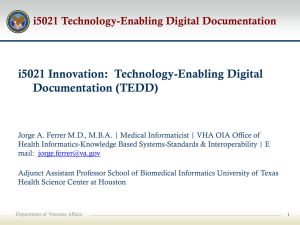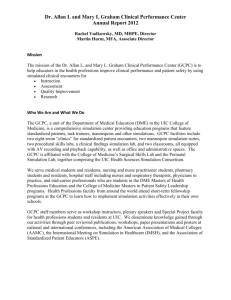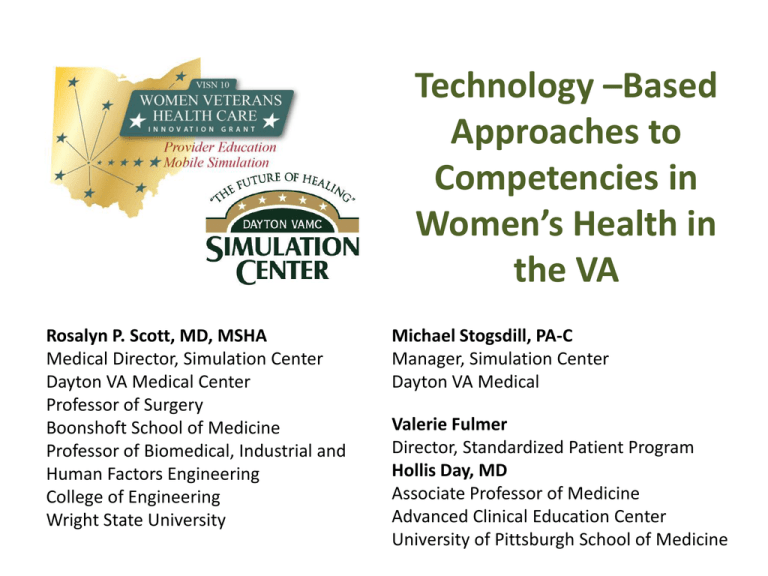
Technology –Based
Approaches to
Competencies in
Women’s Health in
the VA
Rosalyn P. Scott, MD, MSHA
Medical Director, Simulation Center
Dayton VA Medical Center
Professor of Surgery
Boonshoft School of Medicine
Professor of Biomedical, Industrial and
Human Factors Engineering
College of Engineering
Wright State University
Michael Stogsdill, PA-C
Manager, Simulation Center
Dayton VA Medical
Valerie Fulmer
Director, Standardized Patient Program
Hollis Day, MD
Associate Professor of Medicine
Advanced Clinical Education Center
University of Pittsburgh School of Medicine
Women Represent
• 14.5 % of Active Duty military
• 18% of National Guard/Reserves
• 11.6% of Operation Enduring
Freedom/Operation Iraqi Freedom/Operation
New Dawn Veterans
• 6% of VA health care users
Women Users of VA Care
Have Doubled Since 2000
Enhancing Women's Health Competencies in
VISN 10 Primary Care Providers Using Novel
Computer- and Simulation-Based Educational
Strategies
• VISN 10 has experienced an increase in the Women
Veteran enrollees that has exceeded the national
growth rate of approximately 5-6% per annum by
almost 50%.
• A significant number of providers work in rural
CBOC’s where convenient formal and curbside
consultations are not readily available.
• This project was designed to provide educational
experiences using a variety of unique strategies not
previously available in the VA.
Revised VHA Handbook 1330.01: “VHA
Services for Women Veterans”
• Outlines specific services at facilities and Community
Based Outpatient Clinics (CBOCs)
• Defines “Comprehensive Primary Care for Women
Veterans”
• Requires women be seen by Women’s Health Primary
Care Providers
• Details safety and security requirements
• Establishes systematic data collection process
• Includes requirements for ongoing education
Educational Strategies
• Self-directed Online Training
– Mini-Residency Lectures
• Mobile Simulation
– Pelvic and Breast Task Trainers
– Female Physiologic Mannequin
• Case Discussion via Teleconferences
• Standardized Patients
– Motivational Interviewing (MI) Programs
• Virtual Patients
– Reinforce MI scenarios
Training Sequence
• 6 monthly modules comprised of 3-4 online
lectures and teleconference to summarize key
lecture points and discuss cases.
• 3 simulation rotations with activities related to
a lecture in each module – 2 modules/rotation
• 1 day face-to-face Motivational Interviewing
Conference with SP’s
• Virtual patient cases to reinforce training
Delivering Training in a
Mobile Unit
Pelvic and Breast Trainers
• Sensors record pressure and palpation of
pelvic organs and breast masses.
• Pelvic palpation performance can be compared
to novices and experts
• Interchangeable pathologies
• Immediate feedback helps guide learner to
mastery
Female Mannequin
• Learners can integrate skills learned on task trainers
with patient interaction and diagnosis
• Medical team can train together
• Evaluation includes
–
–
–
–
–
–
Interpersonal/Communication Skills
Preparation of Equipment
Examination
Professional Conduct
Patient Education
Processing of Specimens
Motivational Interviewing
Program
• The goal of MI is to promote behavior change by
eliciting and exploring the person’s own
arguments for change and resolving his/her
ambivalence
• Improving communication between primary care
providers caring for predominantly male patients
and women veterans
• Sensitive gender-specific topics: Urinary
Incontinence, Sexual Dysfunction, Sexually
Transmitted Infections, Military Sexual Trauma
• Added session and scenario on time management
during the clinic visit
Early Outcomes
• Invited to apply for renewed funding for FY 13
from Office of Rural Health
• Network is interested in funding construction
of a custom mobile simulation center
• Appointed Field Consultant to national
Women’s Health Education Program
• Opportunity to use some of same strategies in
Palliative Care training
Challenges
• How often should we provide this type of
training to primary care provider teams?
• How best can these strategies be diffused?
• What is the role for self-guided vs. facilitated
learning with task trainers?
• What role can simulation play in establishing
competence for privileging?
Committed to Women
Veterans Health Care
she
earned
these.
It’s our job to give her
the best care
anywhere.

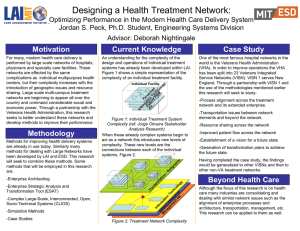


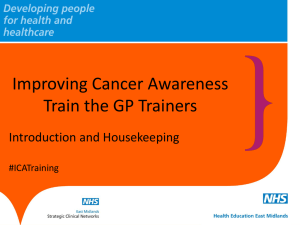


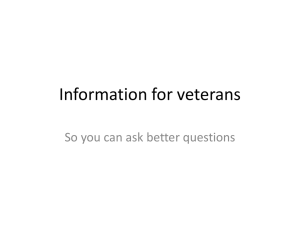

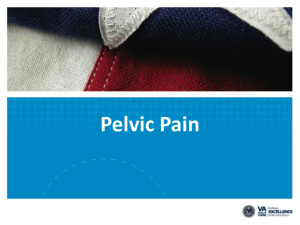
![Clinical documentation [and data capture]](http://s2.studylib.net/store/data/009975627_1-eb27efa1ba4c3c43b709cd7b1a6e7124-300x300.png)
